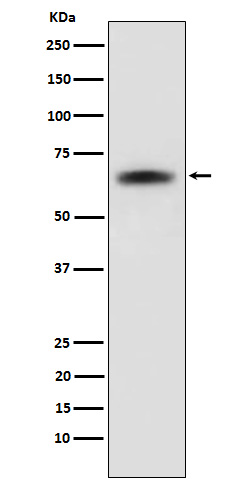产品名称
SENP2 (2D11) Rabbit Monoclonal Antibody
别名
Axam2; Senp2; Sentrin specific protease 2; SMT3 specific isopeptidase 2; Smt3ip2;
纯度
Affinity-chromatography
存储缓冲液
Rabbit IgG in phosphate buffered saline , pH 7.4, 150mM NaCl, 0.02% New type preservative N and 50% glycerol. Store at +4°C short term. Store at -20°C long term. Avoid freeze / thaw cycle.
Human Swissprot No.
Q9HC62
注意事项
SENP2 Antibody is for research use only and not for use in diagnostic or therapeutic procedures.
细胞定位
Nucleus, nuclear pore complex. Nucleus membrane; Peripheral membrane protein; Nucleoplasmic side. Cytoplasm Note=Shuttles between cytoplasm and nucleus
功能
Protease that catalyzes two essential functions in the SUMO pathway. The first is the hydrolysis of an alpha-linked peptide bond at the C-terminal end of the small ubiquitin-like modifier (SUMO) propeptides, SUMO1, SUMO2 and SUMO3 leading to the mature form of the proteins. The second is the deconjugation of SUMO1, SUMO2 and SUMO3 from targeted proteins, by cleaving an epsilon-linked peptide bond between the C-terminal glycine of the mature SUMO and the lysine epsilon-amino group of the target protein. May down-regulate CTNNB1 levels and thereby modulate the Wnt pathway. Deconjugates SUMO2 from MTA1. Plays a dynamic role in adipogenesis by desumoylating and promoting the stabilization of CEBPB (PubMed:
20194620).

